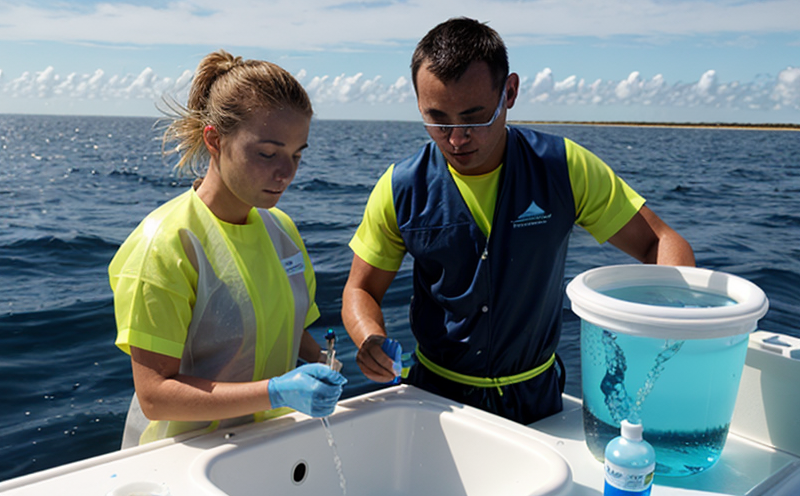ASTM D859 Silica Content Test in Seawater
The ASTM D859 standard is a crucial tool used by quality managers, compliance officers, R&D engineers, and procurement teams to ensure the purity of seawater. This method measures silica content using an acid digestion procedure followed by colorimetric detection. The test ensures that water and wastewater meet specified standards for various applications.
The ASTM D859 method is widely used in sectors such as marine biology, oceanography, environmental monitoring, and industrial processes involving water. In these contexts, the presence of silica can affect biological processes, equipment longevity, or water quality metrics.
Understanding the significance of this test requires a brief overview of silica's role in seawater. Silica is a key component in marine ecosystems, influencing algal growth, plankton health, and overall water clarity. High levels of dissolved silica can also cause issues with reverse osmosis (RO) systems or other desalination plants by forming colloidal silica.
The ASTM D859 method is designed to accurately measure the concentration of soluble silica in seawater samples. This test is essential for industries relying on seawater, including desalination facilities, marine biotechnology firms, and environmental agencies monitoring coastal waters.
For accurate results using ASTM D859, proper sample preparation is paramount. Samples should be representative of the water source being tested, typically collected at specific depths or locations known to have stable conditions. The samples need to undergo digestion in a strong acid environment before analysis. This step breaks down organic matter, ensuring only inorganic silica remains for measurement.
The methodology involves digesting the sample and then titrating it with a reagent that reacts specifically with soluble silica. The endpoint of this reaction is determined using colorimetric detection, which compares the intensity of the colored solution to known standards. This process allows for precise quantification of silica content in parts per million (ppm).
ASTM D859 specifies the equipment and reagents required for accurate testing, including a digestion flask, acid, titrant, and colorimeter or spectrophotometer. The test is conducted under controlled conditions to ensure consistent results. Compliance with ASTM standards guarantees that the silica content in seawater meets regulatory requirements set by various governing bodies.
Accurate measurement of silica content using ASTM D859 is vital for several applications:
- Desalination: Ensuring clean water output free from harmful contaminants.
- Marine Biotechnology: Monitoring environmental impact on aquatic life.
- Environmental Monitoring: Assessing changes in coastal ecosystems due to anthropogenic activities.
- Industrial Processes: Avoiding equipment failures and operational inefficiencies caused by silica buildup.
The ASTM D859 method is robust, but it also requires careful handling of samples and precise procedures. By adhering strictly to the standard, laboratories can provide reliable data that informs critical decisions in various industries.
Scope and Methodology
| Step | Action | Description |
|---|---|---|
| 1 | Sample Collection | Collect seawater samples from the desired location. Ensure they are representative of the water source being tested. |
| 2 | Digestion | Transfer the sample to a digestion flask and add nitric acid. Heat under reflux for 1 hour at 95°C until all organic matter is decomposed. |
| 3 | Titration | Add titrant dropwise until a color change occurs, indicating the endpoint of the reaction with silica. |
| 4 | Colorimetric Detection | Determine the concentration of silica based on the intensity of the colored solution compared to known standards. |
The ASTM D859 method is designed for accurate measurement of soluble silica in seawater samples. This table outlines the key steps involved, each critical for obtaining reliable results.
Eurolab Advantages
At Eurolab, we pride ourselves on delivering comprehensive and precise ASTM D859 tests that meet your specific needs in seawater analysis. Our laboratory adheres strictly to the standard's guidelines, ensuring accuracy and consistency in every test.
- Expertise: Our team of chemists and technicians are trained specifically in performing ASTM D859 tests, delivering high-quality results.
- Modern Equipment: We use state-of-the-art colorimeters and spectrophotometers to ensure accurate measurement of silica content.
- Comprehensive Reporting: Our reports provide detailed information on the test process, results, and any implications for your application.
- Rapid Turnaround: With our efficient workflow, we can deliver results quickly without compromising accuracy.
- Regulatory Compliance: Ensuring that all tests comply with international standards is a priority at Eurolab. This guarantees the reliability of our test results for regulatory bodies and stakeholders.
- Custom Solutions: We offer tailored testing services to meet specific project requirements, whether it's for industrial applications or environmental monitoring.
Choose Eurolab for your ASTM D859 tests. Our commitment to quality and reliability ensures that you receive accurate results every time.
Environmental and Sustainability Contributions
- Reduction of Waterborne Contaminants: By accurately measuring silica content, we help industries minimize the introduction of harmful substances into water systems.
- Support for Sustainable Practices: Our tests provide data that supports sustainable practices in marine biotechnology and environmental monitoring.
- Enhanced Equipment Durability: Ensuring clean seawater reduces wear on equipment, leading to longer operational lifespans and reduced waste.
- Improved Ecosystem Health: By providing precise data on water quality, we contribute to the maintenance of healthy marine ecosystems.
- Resource Efficiency: Accurate measurement helps industries use resources more efficiently by avoiding unnecessary inputs or outputs.
- Regulatory Compliance: Ensuring compliance with environmental regulations supports broader sustainability goals.
The ASTM D859 test, when conducted accurately and consistently, plays a vital role in achieving these environmental and sustainability contributions. Eurolab is committed to helping clients achieve their sustainability objectives through reliable testing services.





